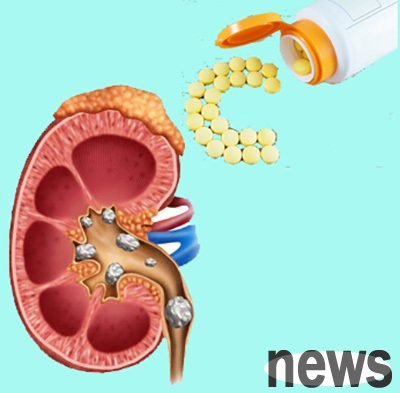I posted on 2021-10-7 to treat cancer? Lipid quality? High dose static injection? , noting that no scientific evidence shows that taking lipid vitamin C, or static injection of high dose vitamin C, can cure cancer. Soon after, my face friend Peter L...

I posted on 2021-10-7 to treat cancer? Lipid quality? High dose static injection? , noting that no scientific evidence shows that taking lipid vitamin C, or static injection of high dose vitamin C, can cure cancer. Soon after, my face friend Peter Liao responded:
"Thank you for sharing and detailed explanations. It takes us a lot of time to understand a essay. The professor always finds the truth from a massive amount of essays. Thank you again. From the professor's article, I remembered that I had read a research report on vitamin C before, which said that after the human body enters more than 1,000 mg of vitamin C, the absorption rate is basically half. After more than 3,000 mg, it is basically not absorbed and excreted from the urine. Taking too many vitamin tablets may also increase the chance of stones. I don’t know if it is correct.”

For questions about the absorption and discharge of vitamin C, there is a person named Alexander Michels who has provided very good answers. This doctor is a researcher and communications officer at the Linus Pauling Institute, and his researcher is the transition from Vitamin C to the body. (Note: Linus Pauling Institute was founded by Dr. Linus Pauling in 1973, and its most important task is to prove that vitamin C can prevent and treat various diseases. Linus Pauling himself advocates taking high doses of vitamin C. )
Dr. Alexander Michels posted a question about Vitamin on the Linus Pauling Institute's website on May 28, 2015 C (Question about vitamin C). I sorted and translated his statement about the absorption and discharge of vitamin C as follows:
1. Vitamin C can stay in the body for several weeks. The vitamin C level in the blood is controlled by the kidneys through a mechanism called "bone reabsorption." This mechanism prevents vitamin C from losing from urine. Taking a large dose of vitamin C can make this system overwhelmed, so the excess will be lost from the urine within a few hours.2. Keeping the blood vitamin C level above the limit set by the kidney has no known advantages.
3. Although the dosage of small doses (less than 200 mg) will be completely absorbed, a large dose of large doses (500 mg or more) can only be absorbed in a small portion.
4. When vitamin C in the blood is at a high level for a long time, the body will try to remove it by increasing excretion in the urine. Therefore, if you take a large dose multiple times throughout the day (such as every two hours), most of them will not be absorbed or will be quickly excreted.
Regarding whether excessive vitamin C supplementation increases the risk of kidney stones, the National Kidney Foundation of the United States published the Family History of Kidney Stones? Watch Those Megadoses of Vitamin C on September 22, 1997. It says: [Truely taking high doses of vitamin C supplements regularly (such as 500 mg or more per day) can increase the risk of kidney stones in some people. This is especially true for people who have had oxalic acid calcites in the past or have a family history of these calcites. The reason may be that at high doses, a large amount of vitamin C will be converted into oxalate salt in the body. A large amount of oxalate salt will appear in the urine, where it can be combined with calcium to form oxalate calcium stone. Garabed Eknoyan, PhD, PhD, President of the National Border Foundation, said: "People with this problem should not take more than recommended daily vitamin C intake (60 mg) as supplement." ]
For research on how vitamin C supplements can increase risk of kidney stones, please see these three articles below:
2003-3-1: Effect of vitamin C supplements on urinary oxalate and pH in calcium stone-forming patients (Effect of Vitamin C replenishing agent on urinary oxalate salt and pH in ceramite patients). This study investigated 47 people with oxalate and 20 normal people and found that high dose of vitamin C supplements may increase urinary oxalate salt excretion and oxalate oxalate incidence rates.2013-3-11: Ascorbic Acid Supplements and Kidney Stone Incidence Among Men: A Prospective Study (Anti-abortionic acid supplement and male kidney stone incidence: a prospective study). This study surveyed more than 20,000 Swedish men and found that high dose of vitamin C increases the incidence of dermatology twice..
2016-3: Total, Dietary, and Supplemental Vitamin C Intake and Risk of Incident Kidney Stones. This study surveyed more than 160,000 women and more than 40,000 men and found that high dose of vitamin C would significantly increase the incidence of kidney stones in men.
Recently noted: There is a signature Hi Professor's readers responded: "According to Professor Lin's standards, this title is suspected of being a sacrificial peach. Excessive addition of vitamin C increases the risk of heart stones. This sentence implies that the two have a causal relationship because the research listed is to observe the nature of , so it can only represent that it is related and does not have a causal relationship. Whether supplementing vitamin C will directly increase the risk of the kidney stone is still to be verified, so the title must be changed to the following to be appropriate: excessive supplementing vitamin C is related to the risk of the kidney stone."
I agree that excessive supplementation of vitamin C and the risk of kidney stones is only related, but the description of "taking a peach" is wrong because I don't just pick articles that are beneficial to me. Please see my Vitamin D Fight against COVID-19, 4 months ago? Su became a doctor's sacred peach.
Original text: Over-replenishing vitamin C increases the risk of kidney stones